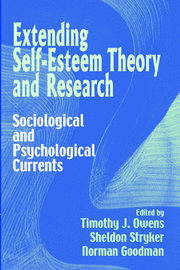Book contents
- Frontmatter
- Contents
- List of Contributors
- SECTION ONE THE FRAME
- SECTION TWO CONCEPTUAL AND METHODOLOGICAL ISSUES
- SECTION THREE SOCIAL AND LIFE COURSE CONTEXTS OF SELF-ESTEEM
- SECTION FOUR SELF-ESTEEM AND SOCIAL INEQUALITIES
- SECTION FIVE SELF-ESTEEM AND SOCIAL PROBLEMS
- 16 The Science and Politics of Self-Esteem: Schools Caught in the Middle
- 17 Self-Esteem and Deviant Behavior: A Critical Review and Theoretical Integration
- 18 Low Self-Esteem People: A Collective Portrait
- Index
17 - Self-Esteem and Deviant Behavior: A Critical Review and Theoretical Integration
Published online by Cambridge University Press: 24 November 2009
- Frontmatter
- Contents
- List of Contributors
- SECTION ONE THE FRAME
- SECTION TWO CONCEPTUAL AND METHODOLOGICAL ISSUES
- SECTION THREE SOCIAL AND LIFE COURSE CONTEXTS OF SELF-ESTEEM
- SECTION FOUR SELF-ESTEEM AND SOCIAL INEQUALITIES
- SECTION FIVE SELF-ESTEEM AND SOCIAL PROBLEMS
- 16 The Science and Politics of Self-Esteem: Schools Caught in the Middle
- 17 Self-Esteem and Deviant Behavior: A Critical Review and Theoretical Integration
- 18 Low Self-Esteem People: A Collective Portrait
- Index
Summary
The relationship between self-esteem and delinquency is arguably one of the most attractive subjects for speculation and empirical investigation and at the same time one of the least understood relationships in the social psychological and sociological literature.
INTRODUCTION
Smelser (1989, p. 18) concludes in his overview of a volume considering the relationships between self-esteem and a variety of social problems, that the social-psychological variable of self-esteem is simultaneously one of the most central and one of the most elusive factors in understanding and explaining the behaviors that constitute major social problems. It is central because it is the omnipresent variable that intervenes between personal and institutional histories of individuals with productive, responsible, and self-realizing behavior, on the one hand, and deviant, self-defeating, socially costly behavior, on the other. … The variable of self-esteem is elusive, however, because its precise role in the drama of self-realization is difficult to pinpoint scientifically; by using the conventional kinds of scientific methods we possess, it is difficult to arrive at strong associations between self-esteem and its supposed causes, on the one hand, and self-esteem and its supposed outcomes, on the other. Or, to put the matter more simply, the scientific efforts to establish those connections that we are able to acknowledge and generate from an intuitive point of view do not reproduce those relations.
- Type
- Chapter
- Information
- Extending Self-Esteem Theory and ResearchSociological and Psychological Currents, pp. 375 - 399Publisher: Cambridge University PressPrint publication year: 2001
- 10
- Cited by



